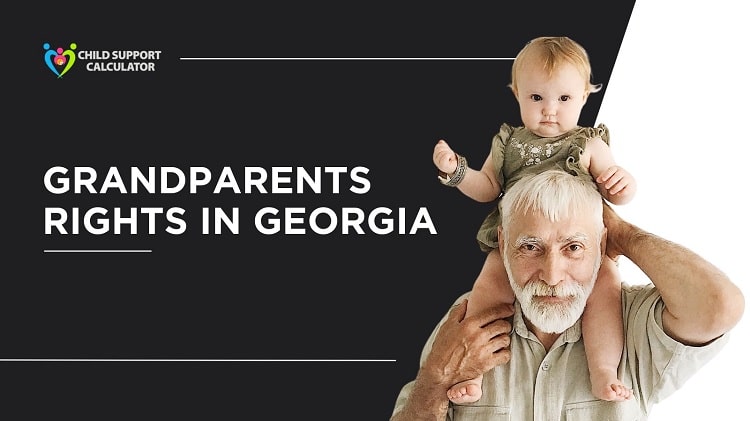Grandparents Rights In Rhode Island
Both parents and grandchildren can benefit from the assistance of grandparents. However, amid difficult situations such as death, divorce, or separation, parents are more likely to cut off a grandparent’s contact with a grandchild — times when parents and grandkids need support the most. A grandparent can petition the court for visitation privileges with a grandchild in several conditions. Grandparent visitation will be determined by a court based on the individual facts of your case.

Grandparent visitation rights cases are similar to regular custody disputes in that the child’s best interests are paramount. Before requesting grandparent visitation privileges, make sure you’re familiar with your state’s laws. Grandparent rights in Rhode Island are discussed in this article.
Grandparent Visitation Laws In Rhode Island
Someone may bring up the Troxel v. Granville case in a conversation concerning grandparent rights in Rhode Island. The Supreme Court of the United States heard an appeal in 2000 addressing the validity of Washington’s grandparent visiting legislation. The Troxel case established certain significant guidelines for grandparent visits that are now followed by every state.
Grandparent visitation rights are not governed by federal law. Grandparent visiting laws vary by state, with some states having harsher regulations than others. Nonetheless, as a result of the Troxel decision, every state’s grandparent visiting statute must consider the child’s best interests.
Furthermore, a court cannot assume that grandparent visitation is always in the best interests of a child. Instead, a judge will consider a parent’s reasons for opposing grandparent visits, a child’s physical and emotional requirements, and the grandmother-grandchild bond when deciding whether or not visitation is acceptable.
Grandparent Visitation Rights In Rhode Island
A grandmother cannot petition for visitation unless one or both of the child’s parents have died, the child’s parents are divorcing, or a custody proceeding is in progress. A judge in Rhode Island refused grandmother visitation because more litigation would be detrimental to the child’s best interests.
The child’s mother had recently died, and the grandparents sought an independent child evaluation for their grandchild 18 days later. The judge decided that the child’s well-being was more vital than continued grandmother visitation and that some peace and relief from litigation was more necessary.
Grandparent contact is permitted in Rhode Island after a court hearing and the presentation of proof that:
- Grandparent visitation is in the best interests of the grandchild.
- The grandparent is suitable for exercising visitation rights with the grandson or granddaughter.
- During the 30 days leading up to the grandparent filing a petition for visitation, the grandparent attempted to visit the grandchild several times, but the parent(s) refused.
- Without the help of the court, the grandmother will be denied visitation.
- The grandparent successfully proved that the parent’s opposition to allowing grandparent visits is irrational.
In another Rhode Island instance, maternal grandparents were denied visitation after their daughter (the kid’s mother) died because it was not in the child’s best interests. The grandparents were competent and appropriate to care for the child and had a great relationship with their granddaughter.
Still, after the mother’s death and his own remarriage, the child’s father barred grandparent visitation. Grandparent visitation only served to inflame tensions between the child’s father and the grandparents.
Even though the child showed a wish to keep in contact with her grandparents, the court ruled that visitation was not suitable since it was causing the child stress. This case demonstrates that a child’s relationship with his or her parents is more vital than keeping in touch on a regular basis.
Can a grandparent obtain visitation after a grandchild is placed for adoption?
Adoption severs biological grandparents’ ties with their grandkids for good. Even if an adopted grandchild was adopted by a stepparent, Rhode Island adoption laws are quite rigorous, and a grandparent cannot pursue visitation with (or custody of) an adopted grandchild.
A paternal grandpa in Rhode Island, for example, was denied visitation with his grandchild after the kid was put for adoption. The father of the child had no objections to the child being adopted by a stepfather.
Because he lacked standing, the paternal grandfather’s attempts to intercede and block the adoption were unsuccessful. The legal rights of a grandparent to visitation are based on the rights of a natural parent. When a parent willingly gives up his or her parental rights, a grandparent’s visitation privileges are likewise ended.
The rights of a grandmother to visit with a grandchild are secondary to a parent’s rights. Unfortunately, some parents abuse their power by forbidding or severely restricting their children’s time with their grandparents. An involved grandmother may have legal remedies to acquire visitation or even custody of a grandchild in certain circumstances.
Grandparent Custody Rights In Rhode Island
A biological or adoptive parent has an unalienable right to child custody. Unless a parent is unsuitable or one parent has died, and the surviving parent is unfit or unwilling to care for the child, third parties such as grandparents cannot interfere with a parent’s claim to custody.
Furthermore, during termination of parental rights lawsuit, custody matter, or divorce, a grandparent can only intervene to gain custody of a child. Any custody decision must always prioritize the best interests of the child.
Even though the child’s father was unsuitable, a judge in Rhode Island refused the paternal grandparents’ custody request under grandparents rights in Rhode Island. When the child was two (2) years old, the mother voluntarily gave up her parental rights to an adoptive couple.
Because the child’s father had a history of sexual abuse, substance misuse, and criminal mischief, he was deemed unfit to be a parent, and his consent was not required to finalize the adoption. The grandparents’ petition for visitation and custody was eventually filed too late, and they lacked standing to stop the adoption.4
Grandparents are not entitled to custody of a grandchild simply because they are biologically related to the child or believe they could parent the child better than the child’s parents. When determining custody, a court will consider the totality of circumstances as well as the child’s emotional and physical needs. In any situation, the rights of a grandmother will always take second place to a parent’s rights.
FAQs
Grandparents and relatives in Rhode Island have the ability to petition the Family Court for permission to visit with a grandchild and other relatives. Grandparents or relatives are sometimes avoided by one spouse during or after the divorce process.
If their child, who is the child’s parent, has been denied visitation or has failed to exercise his or her entitlement to visitation, grandparents may sue. Even if the grandkids in question reside in an intact household, Rhode Island frequently appears on lists of states that allow grandparents to sue for visitation.
In summary, grandparents in any of the 50 states do not have a legal right to see their grandchildren. The law is designed to safeguard parental rights above all else, and granting grandparents visitation privileges automatically is considered as a breach of a parent’s ability to choose what is best for their child.
You’ll find everything you need to know in this article. Grandparents do not automatically have access to their grandkids under the law. As a result, parents can virtually always opt to keep their children away from grandparents. This isn’t to say that grandparents don’t have choices.
Is it possible for a parent to give a grandmother temporary custody of their child? When parents are unable to care for their children due to unanticipated circumstances, grandparents can gain temporary custody of their grandkids. Typically, grandchildren will begin living with their grandparents in this situation.







